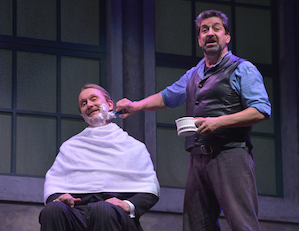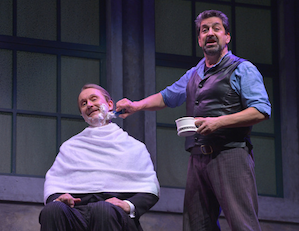
No matter how you slice and dice and grind it, Sweeney Todd delivers.
Please indulge the groaner double entendres about a show devoted to the exploits of a revenge-driven London barber who slits his many victims’ throats and helps bake their thrice-ground flesh into meat pies for an avid London public. Stephen Sondheim’s 1979 musical theater masterwork invites the word play. From its jaunty gallows humor and fiendishly playful lyrics to a score that percolates from waltzes and sea ditties to aching ballads and soul-scouring anguish, the show exudes an exuberant human and theatrical vitality, deeply rooted as it is in human suffering. Joking about the very worst things that people do to each other is — forgive me again — in Sweeney Todd’s blood.
From Broadway theaters and opera houses to symphony hall concert versions and the 2007 Tim Burton film starring Johnny Depp as the “demon Barber of Fleet Street,” directors can’t resist this extraordinary work. Harold Prince’s original Broadway production was an epic theater marvel, with a gigantic bridge-and-girders set and a scalding dramatic temperature. Twenty-five years later, John Doyle stripped the show down to a cast of 10, with the actors not only playing multiple parts but the entire (reduced) score as well.
A new TheatreWorks revival at the Mountain View Center for Performing Arts (playing through November 2), sets the action in a kind of expansive, double-level air raid shelter in a shell-shocked 1940. Warning sirens keep going off. A huge tunnel orifice, in designer Andrea Bechert’s gloomy unit set, leads off into some deep bunker space of the subconscious. The panicked cast spills out into the audience at various times, as if to escape the impending horror that’s about to come crashing down on them — and us.
To his credit, director Robert Kelley, a devoted Sondheim acolyte who has directed many of the composer/lyricist’s works with distinction over the years, doesn’t press his World War II London Blitz concept too hard. This is Sweeney Todd after all, gleaming and indestructible.
In the early going on opening night, unfortunately, the luster was hard to find. Curiously disjointed and musically adrift, the production offered dim prospects. One after another of the singers failed to land their notes and track the sinuous and staccato Sondheim melodies. Conductor William Liberatore’s nine-member band sounded patchy and unbalanced, with the woodwinds dominating unpleasantly and the string sound missing in action.
David Studwell, making his TheatreWorks debut in the title role, came across as an oddly disengaged Sweeney. His gravel voice took flight in some lyrical spots (“Pretty Women”), but he never seemed to find common comic ground with Tory Ross’ cheerfully cynical Mrs. Lovett, the baker of the “worst pies in London” and his accomplice in crime. The famous Act 1 closer, a brilliantly sustained catalog of how various professions taste (“A Little Priest”), produced only the palest wash of laughter. Studwell, who may be a shade too studly (sorry) for a character who’s lived in Australian exile for15 years, did rage and dissociation much better than misery and grief. The role needs all of it.
But there were also some assets that began to come together. Jack Mosbacher displayed a warmly handsome voice and beamish demeanor as Anthony, the sailor who’s in love with Sweeney’s daughter, Johanna. In both voice and manner, Mindy Lym was too tightly wired in Johann’s flutey opening song (“Green Finch and Linnet Bird”), but her depiction of a sweet girl unhinged by confinement and the sudden prospect of release (the mordantly funny “Kiss Me” duet with Mosbacher) was a standout moment, erotically and psychologically complex.
There were others, especially in a second act that gained both musical and dramatic cohesion. Ross gave full comic value in Mrs. Lovett’s flirty “By the Sea,” Martin Rojas Dietrich’s big-bellied, borderline castrato Beadle Bamford tweedled out a set of ludicrously winning “Parlor Songs.” In the piercingly simple “Not While I’m Around,” sung with the trusting young Tobias (a touching Spencer Kiely), Ross helped reveal one of Sweeney’s brilliant wrought wonders.
Structured as a textbook da capo aria, the song begins in one emotional key, smuggles in a major plot development and ends on bleakly distant terrain. It’s no stretch to compare Sondheim to Mozart in his formal mastery here. The scene was movingly staged and sung, the last fluttering heartbeat of tenderness before the final bombs fell.
Without a first-rate hero and hobbled by its musical missteps, the production never took on the full measure of poisonous, mad drive it needed. But when the company assembled for the final, full-throated reprise of “The Ballad of Sweeney Todd,” this operatic musical’s glaring, communal intensity came through. “Attend the tale of Sweeney Todd,” these ravaged Londoners commanded, staring the audience straight on. They had, by then, our full, spine-shivering attention.

